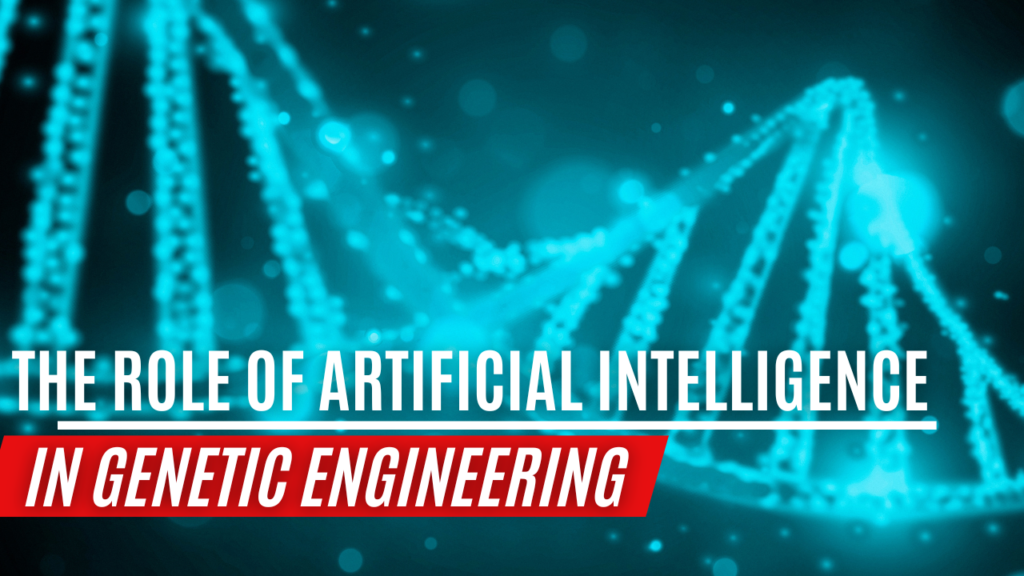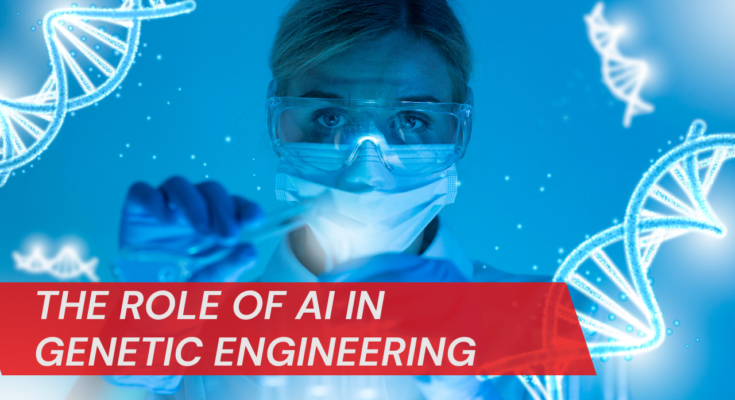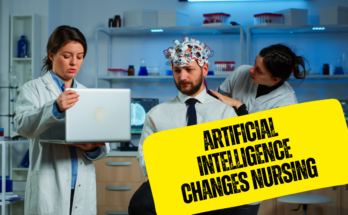The Role Of Artificial Intelligence In Genetic Engineering
Artificial intelligence (AI) significantly impacts genetic engineering by accelerating advancements in various fields, such as agriculture and medicine. AI technology enhances genomic engineering processes, offering numerous benefits while addressing existing challenges. This article delves into the crucial role of Artificial Intelligence In Genetic engineering, discussing its applications, advantages, issues, and potential future growth.

Introduction to Genetic Engineering
Genetic engineering can alter the genetic make-up of an organism to achieve specific desirable traits or outcomes such as improving the health of an organism or crop can be conducted at a level as small as a DNA level allowing the engineer to insert, remove or change genes in the genome of an organism The achievement of genetic engineering has important use in many fields. These include medicine, agriculture and environmental conservation go.
Defining Genetic Engineering
Genetic engineering involves a suite of methods for manipulating living cells’ genomes by introducing new genes or altering the way they’re expressed or by deleting genes.
Importance of Genetic Engineering
- Genetic engineering has helped us to develop treatment for various diseases, increase harvests of agricultural commodities and develop new therapeutics.
- Through manipulation of the genotype of living species, we can change certain traits in organisms making forthcoming generations to improve the best traits in genes.
- There are multiple issues that have been addressed through genetic engineering, common among them are diseases due to genetic disorders, reduced yields in farms and also therapeutics.
Emergence of Artificial Intelligence In Genetic Engineering
An AI-driven approach to evolution means utilizing machines that emulate human thought processes to enhance existing genetic engineering approaches, enabling improved research, analysis and innovation.

Introduction to Artificial Intelligence
Artificial Intelligence is a general concept describing a spectrum of technologies in different stages of development that allow computers to exhibit human-like intelligence by learning from experience, adjusting to new inputs, mastering complex tasks, recognizing patterns, predicting events, and making recommendations. Machine-learning algorithms, for example, can identify distinct groupings in large complex datasets, perhaps by taking non-logical shortcuts; neural-network models use patterns of interconnected cell-like processors arranged in layers to mimic the activity of neurons.
Integration of Artificial Intelligence In Genetic Engineering
The integration of Artificial Intelligence In Genetic engineering has facilitated the analysis of complex genomic data, accelerating the pace of discovery and innovation.
Thanks to the infusion of Artificial Intelligence In Genetic Engineering, the collection, storage and analysis of enormous amounts of complex genomic information is becoming faster. AI’s algorithms are able to sift through these molecular data, predict the functions of genes and even optimise the design of experiments. These features are providing researchers with unprecedentedly quick and detailed insights into the genome and its workings.
Applications of Artificial Intelligence In Genetic Engineering
Artificial intelligence (AI) has ushered in a new age of genetic engineering by giving sophisticated tools and algorithms that are transforming every aspect of the discipline. These AI-powered tools are being used in a variety of applications, ranging from research to diagnosis and therapy, radically altering the landscape of genetic engineering.
In research, AI-powered algorithms are useful for analyzing massive volumes of genetic data at new speeds and precision. These algorithms may quickly detect patterns, correlations, and genetic variants that might have otherwise gone unreported. By revealing these insights, scientists might get a better knowledge of genetic processes, disease pathways, and prospective treatment targets.
1. Genome Sequencing
Artificial intelligence (AI) algorithms have transformed genomic sequence analysis, providing unprecedented speed and precision. These powerful algorithms can handle massive volumes of genetic data quickly and precisely, opening the path for whole genome sequencing and the discovery of genetic variants associated with specific illnesses or features.
The capacity of AI systems to rapidly analyze genetic sequences has changed the science of genomics. Genome sequencing on a broad scale is now possible, allowing researchers to quickly decode an organism’s or individual’s genetic composition. This comprehensive method reveals important information on the genetic basis of illnesses, characteristics, and biological processes.
2. Gene Editing
Artificial Intelligence (AI) has facilitated significant advancements in gene editing platforms, exemplified by technologies like CRISPR-Cas9. These AI-powered gene editing platforms streamline the process of precisely modifying DNA sequences, presenting promising avenues for treating genetic disorders and gaining insights into gene function.

CRISPR-Cas9, coupled with AI algorithms, enables researchers to target specific regions of the genome with unparalleled accuracy and efficiency. AI algorithms optimize the design of CRISPR guide RNAs, ensuring precise targeting of DNA sequences while minimizing off-target effects. This precision is critical for avoiding unintended genetic alterations and maximizing the therapeutic potential of gene editing techniques.
3. Predictive Modeling
Artificial intelligence (AI) models have shown amazing ability to anticipate how genetic variants impact phenotypic features, revolutionizing the design of personalized medicines and the manufacture of genetically modified organisms (GMOs) with specified properties.
AI models can analyze massive volumes of genomic data using advanced algorithms and machine learning approaches to uncover connections between genetic variants and observable characteristics. Deciphering these intricate linkages allows AI to forecast how certain genetic changes will emerge in an organism’s phenotype, such as physical features, behavior, or illness susceptibility.
4. Drug Development
Artificial intelligence (AI) is transforming the drug discovery process by drastically speeding up many key phases. AI has been used to analyze molecular interactions, predict drug-target interactions, and find novel medicinal compounds with improved effectiveness and safety profiles.
In drug development, AI algorithms are critical in analyzing large datasets of chemical structures and interactions. These algorithms use machine learning and data mining approaches to rapidly sift through enormous volumes of chemical and biological data in order to uncover new medication candidates. This capacity to quickly analyze complicated chemical interactions enables researchers to speed up the drug development process, possibly lowering the time and money needed to bring novel medications to market.
Advantages of Artificial Intelligence In Genetic Engineering
The integration of AI confers several advantages to genetic engineering endeavors, enhancing efficiency, precision, and scalability.
| Advantage | Description |
|---|---|
| Precision and Accuracy | AI algorithms can analyze complex genomic data with unparalleled precision, enabling precise manipulation of genetic material and identification of subtle genetic variations associated with diseases or traits. |
| Speed and Efficiency | AI-driven workflows expedite processes such as genome sequencing, gene editing, and drug discovery, significantly reducing the time and resources required for research and development. |
| Cost-effectiveness | By automating labor-intensive tasks and optimizing experimental designs, AI technologies mitigate costs associated with genetic engineering projects, making research more accessible and affordable. |
| Automation of Repetitive Tasks | AI systems automate repetitive tasks, such as data analysis and experimental optimization, allowing researchers to focus on high-level decision-making and hypothesis generation. |
Challenges and Limitations
While artificial intelligence (AI) has enormous potential in genetic engineering, its integration introduces a number of obstacles and constraints that must be carefully considered and resolved. One key difficulty is the ethical implications of Artificial Intelligence In Genetic tinkering. Consent, equity, and the possible implications of genetic alteration all raise ethical considerations. Questions about the moral consequences of changing the fundamental building elements of life must be answered openly and ethically.
Furthermore, the massive volumes of genetic data created and analyzed by AI systems pose questions concerning data privacy and security. Protecting sensitive genetic information from unauthorized access or exploitation is critical to ensuring people’ privacy and liberty.
Future
Artificial Intelligence In Genetic engineering signifies a beacon of hope for revolutionary advancements not only in healthcare and agriculture but also across various other domains. This promising technology has the potential to usher in transformative breakthroughs that could reshape the way we address challenges and harness opportunities in these critical sectors. However, unlocking this potential necessitates a concerted effort to confront and overcome a myriad of ethical, regulatory, and technical challenges.
Firstly, ethical considerations loom large in the integration of Artificial Intelligence In Genetic Engineering practices. Questions surrounding the ethical implications of manipulating genetic information, including issues of consent, equity, and unintended consequences, demand careful deliberation and ethical oversight. Ensuring that AI-driven genetic engineering endeavors uphold ethical standards and respect human values is paramount to their responsible and ethical implementation.
Conclusion:
In conclusion, Artificial Intelligence In Genetic Engineering play a vital role, offering new avenues for research, diagnosis, and treatment. By harnessing the power of AI-driven tools and algorithms, scientists can unlock the potential of the genetic code to address pressing challenges in healthcare, agriculture, and beyond. However, realizing the full benefits of Artificial Intelligence In Genetic engineering requires addressing ethical, regulatory, and technical considerations while fostering collaboration and innovation.
FAQs
How does AI enhance genome sequencing?
AI algorithms analyze genomic data rapidly and accurately, identifying genetic variations associated with diseases or traits.
What are the ethical concerns surrounding Artificial Intelligence In Genetic engineering?
Ethical concerns include issues of consent, equity, data privacy, and potential unintended consequences of genetic manipulation.
What are the advantages of AI in drug development?
AI accelerates drug discovery by predicting molecular interactions, identifying therapeutic compounds, and optimizing drug-target interactions.
How does AI mitigate costs in genetic engineering projects?
By automating labor-intensive tasks and optimizing experimental designs, AI technologies reduce the time and resources required for research and development.
What is the future outlook for Artificial Intelligence In Genetic engineering?
Artificial Intelligence In Genetic engineering holds promise for transformative breakthroughs in healthcare, agriculture, and environmental conservation, but requires careful consideration of ethical.

